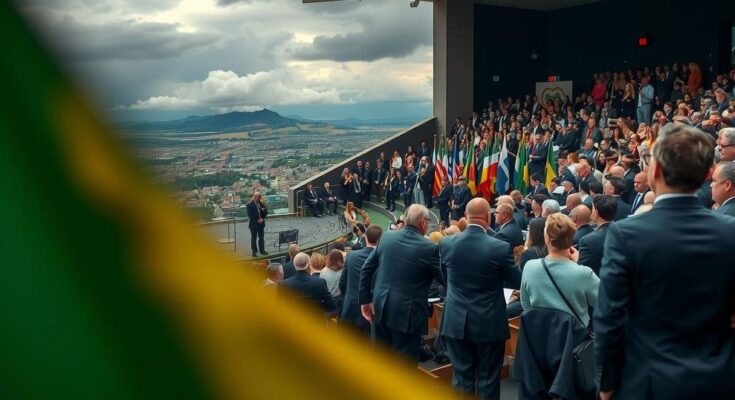Leaders from the G20 nations gather in Brazil to address global issues such as poverty and climate change. Notable attendees include US President Joe Biden and Chinese President Xi Jinping. The summit seeks to forge consensus on sustainable development and environmental protection, particularly regarding the Amazon. Brazilian President Lula da Silva has called for aid from wealthy nations for forest conservation, especially amid the upcoming US political shift under President Trump.
Leaders of the G20 nations are convening in Rio de Janeiro, Brazil, for a two-day summit commencing on Monday, where discussions will focus on pressing global issues including poverty and climate change. Among the prominent attendees are Japan’s Prime Minister Ishiba Shigeru, US President Joe Biden, and Chinese President Xi Jinping, who recently concluded talks at the APEC summit in Lima, Peru. The leaders are anticipated to deliberate on strategies to combat hunger and poverty, as well as share perspectives on sustainable development and environmental responsibility in relation to climate change. These challenges have persisted particularly for developing and emerging nations. The host of the summit, Brazilian President Luiz Inacio Lula da Silva, emphasized the importance of protecting the Amazon, stating on Saturday, “it’s time to tell the world what the Amazon wants,” and underscored the need for financial support from affluent countries to safeguard forests. The summit poses a significant opportunity for G20 members to attempt to forge a consensus despite varying stances on these issues. The gathering is particularly notable as it occurs shortly before the upcoming inauguration of President Donald Trump, who is perceived to show reluctance towards robust climate action and favors bilateral negotiations. The discussions may be further complicated by these dynamics, thus raising questions about the G20’s potential to reach collective solutions for the salient challenges at hand.
The G20, comprising the world’s largest economies, serves as a pivotal platform for addressing global issues that transcend national boundaries. The current summit’s focus on poverty and climate change reflects a growing recognition of the interlinked nature of economic stability and environmental sustainability. Developing nations, in particular, have long grappled with these challenges, making international dialogue crucial. Brazilian President Lula da Silva’s leadership intentions are aimed at garnering support for environmental protection, especially for the Amazon, which is facing significant threats from various fronts.
In summary, the G20 summit in Brazil represents a crucial juncture for international leaders to engage in meaningful dialogue on combating poverty and climate change. With a collective approach needed to address these issues, the summit may serve as an opportunity for the nations to build consensus despite differing positions on climate actions, particularly in light of the forthcoming change in the US administration.
Original Source: www3.nhk.or.jp




